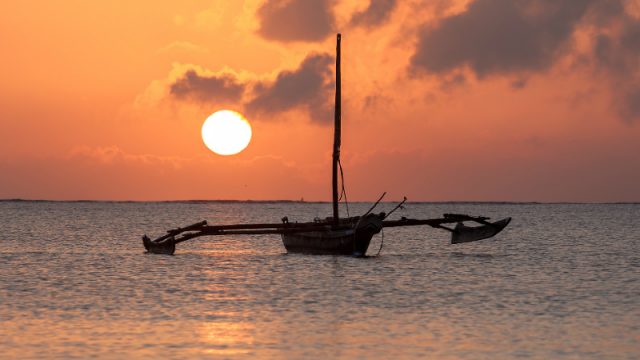Many foreign tourists head to the Kenyan coastal towns of Mombasa, Malindi and Watamu to relax and get suntans on the white sandy beaches, after chasing Africa’s big game across dusty savannas.
But some foreign women are there to meet Kenya’s “beach boys.” And these young, energetic men, who are seeking to engage in romantic relationships for economic gain, are happy to oblige.
Along the waterfronts and shorelines fringed with coral reefs, it is not unusual to see Samburu and Maasai men dressed in red and black traditional garb and beaded jewelry walking and evidently flirting with foreign women as old as their mothers.
The mystique of African men, especially “warriors” from the Maasai and Samburu tribes, has long drawn European women of a certain age. Some are lonely, while others are looking for a distraction. Many have found “love” in the strong arms of these warriors.
Elfie Lemakatoi, 70, a German national, visited Watamu (in Kilifi County) in 2004. There she met Andrew Lemakatoi, 40, a Samburu tribesman. They courted for a while, then got married in November 2005.
Since Andrew didn’t speak German and Elsie didn’t speak English, he proposed to her by drawing a heart on a sandy beach, inside which she wrote “YES.” They formed a civil union which binds them to date.
“I looked at this man and fell in love. I like this Samburu,” Elfie said as she narrated her story to Judy Kosgei, a journalist who reports for Kenya’s Citizen TV.
“I was too excited. I did not know whether to run or scream,” said Andrew recalling the day she agreed to be his. Andrew speaks fluent Samburu and passable Swahili and English.
Looking at this relationship on the surface, it might seem like a page ripped from a slightly unconventional May-September fairy tale, and played out in real life.
But it’s more complicated than that. Andrew was excited, but not because of love.
The women may believe they are truly in love, but the young men are on a different mission. A mission that thrives on the desperation of whites with deep pockets.
“I had only 3 goats and no job, so I went down to the coast to look for a white woman,” explained Andrew. “[When I reached the coast] I used to sing in hotels as an entertainer for tourists. I would then go and sell traditional Maasai or Samburu antiques. I however knew that my motive was to get a white woman.”
In Samburu culture, a man cannot be elevated to the status of an elder if he does not slaughter a bull at the home of the woman he is supposed to marry in a traditional ceremony. A marriage certificate in Andrew’s culture is just a piece of paper and cannot be honored by current elders for him to join their ranks.
Andrew, who openly admits that he is not happy in the marriage and that he took the vows because he was poor, says he will marry another woman. He will do so because he wants to be made an elder and get children.
“I once told [Elfie] that I will marry another woman because I need children. She has two children [from a previous marriage who live and are working] in Germany. I will marry another woman whether she agrees to it or not,” Andrew revealed.
“What really drives the boys to the beach is poverty. The lure of a good life from the one they have experienced in the village is the major driving factor,” said Charles, who has lived at the Kenyan coast for over 20 years. “Tourists come with goodies and have the leisure and easy cash that they can spend as they please, and this greatly attracts the boys.”
“For some it is laziness, as they want the easy way of riding to wealth and the good things that come with having wealth,” he added.
Beach boys will not only use Viagra, if need be, to be successful in their trade, but have gone the extra mile to learn some of the languages spoken by the tourists.
“Malindi is referred to as ‘Little Italy,’ since beach boys there are fluent in Italian yet can hardly speak any English. This is based on the fact that the clientele is predominantly Italian. The Italians have made Malindi their second home,” Charles explained.
“Most beach boys have acquired very little formal education, and for them to speak a foreign language fluently shows nothing short of dedication,” he said. “What seems to attract the older women is the sex, and their carefree attitude towards life.”
Not only are these relationships mutually exploitative, but they can be dangerous from a health perspective. Some of the beach boys do not practice safe sex and drug users often share needles, increasing the risk of HIV transmission.
“NGOs and Ministry of Health officials have carried out numerous campaigns to sensitize them on HIV and AIDS but this is not enough,” Charles told <i AFK Travel. “In the past condoms were being distributed, but a religious outcry from the predominantly Muslim community at the coast brought that program to a halt. The danger of spread of HIV is also real as these boys use drugs and most times share syringes.”
Elfie and Andrew’s story ended differently than most. After their marriage, Andrew took her to live in his remote, dusty village in Samburu county, hundreds of miles from where they met.
But most of the relationships between foreign women and the beach boys are short-lived. The women have a way out by going back to their home country and continuing with their life trajectory.
What they leave behind are bolder beach boys who continue to court white women on the beaches as they try to get their attention, and money.

